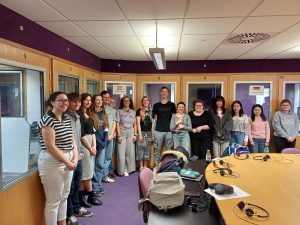Over 60 participants, including pupils from a number of schools from across Scotland, the UK and as far as Spain, joined this year’s online version of the LINCS multilingual debate. During the debate, our current interpreting students were key in facilitating communication across languages. This year’s panel included Mr. Paillet, French Consul, and Mr Muller, […]
Tag: Multilingualism
LINCS Multilingual Roundtable: Discussing AI and its impact on society, through the lens of Klara and the Sun, by Kazuo Ishiguro
Will AI ever become sentient? Are AI-based companions the future for children? How dangerous is online-only education for young people’s social and emotional skills development? Could AI become a viable way to tackle loneliness and even grief? All these questions, embedded in celebrated author Kazuo Ishiguro’s recent novel Klara and the Sun were discussed at […]
Borderland identities
by Kerstin Pfeiffer “Wie, Sie … äh… du weißt nicht wie Snapchat geht?” Three pairs of eyes fix me in complete disbelief. A part of me wants the floor of the rehearsal room to open wide and swallow me there and then. For the third time in less than two hours I am […]
Call for abstracts: Multilingualism in Politics
by Katerina Strani We are seeking abstracts of chapters to be included in an edited volume on Multilingualism in Politics. This edited volume aims to make a significant contribution to the area of multilingualism in politics. Starting from the premise that language influences the way we think and ultimately the way we argue (Whorf, 1956; […]
LINCS BSL team rock at Critical Link 8
by Stacey Webb Over the past year, Christine Wilson and the rest of the organising committee have been planning Critical Link 8 (CL8), which was hosted at Heriot-Watt University 29-June – 1 July, with pre-conference activities on 27-28 June. Therefore, the Monday after the SML graduation, Heriot-Watt staff and student volunteers were busy ensuring the success of […]
EIRSS 2016 programme updated!
This year’s Edinburgh Interpreting Research Summer School (EIRSS) is taking place on 04 – 08 July 2016, right after Critical Link 8. We are delighted to have Daniel Gile as our guest speaker again this year. Professor Gile was also our guest speaker in the inaugural EIRSS in 2013. The EIRSS is designed to offer intensive research […]
A taste of the real thing
by Fanny Chouc Heriot-Watt’s interpreting students were given a great opportunity to apply their skills to a real-life setting thanks to Heriot-Watt Engage. They interpreted for the Illuminations event, which was held on campus on Wednesday 02 December to mark the end of the UN Year of Light. As part of this event, Professor Jim Al-Khalili gave a fascinating […]
Translating Cultures and the Mediation of Indigenous Rights in Peru
While we were all busy teaching, marking papers, setting exams, attending conferences and writing papers, Dr Raquel de Pedro Ricoy spent part of the first semester in the jungle. Literally. Raquel is working on an AHRC-funded project entitled “Translating Cultures and the Mediation of Indigenous Rights in Peru” with Prof. Rosaleen Howard (Newcastle University) and […]
EU study on Public Service Translation in Cross-Border Healthcare is out!
After 10 months of non-stop work, we are delighted to announce that an EU study on Public Service Translation in Cross Border Healthcare, led by Prof Claudia V. Angelelli is published. The Report, commissioned by the Directorate-General for Translation, responds to an increasing interest in the role of language provision and information access in cross-border healthcare. Linguistic […]
Les publics multilingues
by Katerina Strani This post was originally published in the CREM research blog Publics en Question. For a similar (but not identical) English version, please visit this page. Il a longtemps été prouvé que notre langage a un impact sur la façon dont nous pensons et, finalement, la façon dont nous soutenons nos arguments (Whorf, […]



